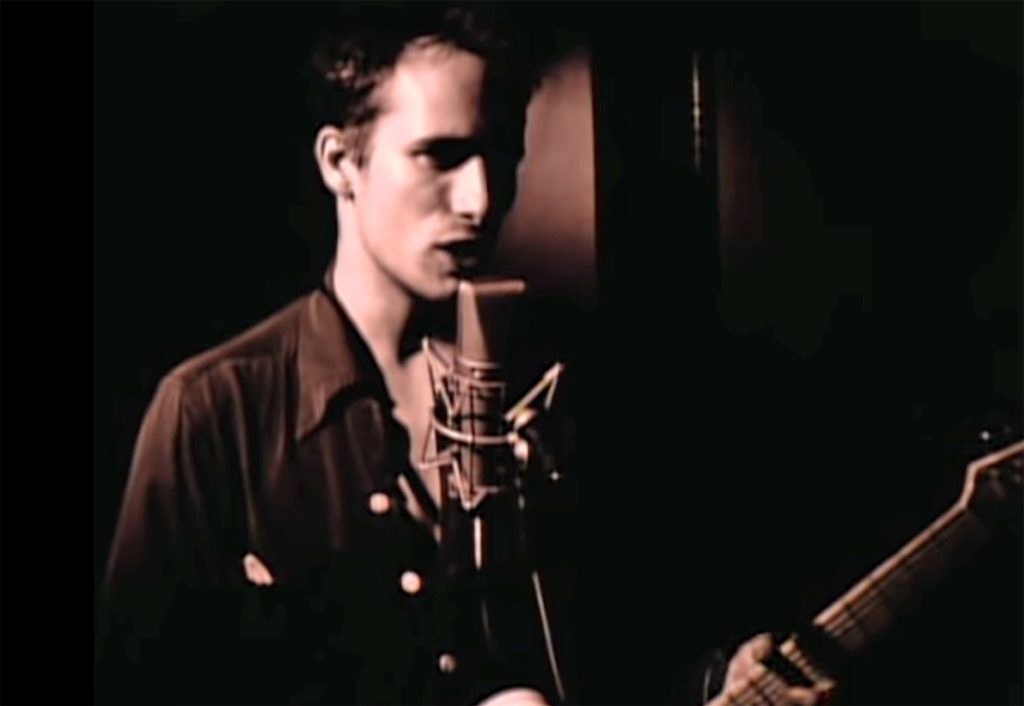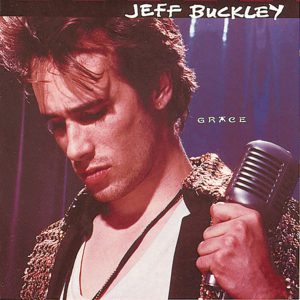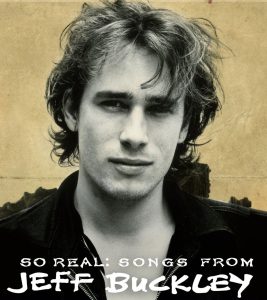
By Simone Goldstone, NB Indy Soundcheck Columnist
Orange County has given us incredible talent, which we have a lot to be proud of.
Artists that broke through social pressure with their wild ingenuity, who hungered for something more than our picturesque sandy shores and amusement parks that drove them to unimaginable success, who grew up with the same groves and beaches we did. We’ve been home to old souls who can write songs that touch our hearts.
One such talent was Jeff Buckley, who died 25 years ago on May 29, 1997.
You might know singer, songwriter and guitarist Buckley from his cover of “Hallelujah,” but Jeff is so much more than a heart-breaking Leonard Cohen tune—although it’s worth noting that Jeff’s version is the one in the National Archives.
Jeff’s ability to emote with such ethereal grace made him a legend among legends, and grace is at the crux of it all. He only graced this world for a short time, and yet Jeff did everything with grace: the way he lived, the way accepted the troubles and turmoil of his early life, and the way he sang straight from his soul.
“Grace” is the name of his first, and only, studio album released while he was alive. Jeff was everything an artist should be: inimitable, boundary-breaking, and with a consciousness that not many have in this lifetime.

Early Life
Buckley was born at Martin Luther Hospital in Anaheim to Mary Guibert and folk singer Tim Buckley.
“He’s a true Orange Countian,” his mother recalls, “We lived right near Lincoln and Brookhurst, so all you had to do was make a left and zoom on down Brookhurst until you got to Huntington Beach. From the time he was in diapers, that’s what we’d do almost every Saturday.”
Guibert moved to Anaheim when she was just five years old, where she watched Disneyland being built from her window and attended opening weekend when she was seven. She even has a picture of her with Walt Disney himself.
Jeff’s coastal childhood can be heard in many of his lyrics. He has a memory of being just four years old and frightened of the ocean. His grandfather buoyed him through the swelling waves. Safe in his grandfather’s hands, his fear receded like the shoreline. Water has seeped into many of his songs, from “Grace” to “Opened Once” to “Nightmares By the Sea.”
In “Dream Brother,” he writes “Asleep in the sand with the ocean washing over.
In “Grace,” “I hear them drown my name / I’m not afraid, afraid to die.”
Many people speculate that Jeff sang about his tragic drowning as if he somehow knew it would happen before it did. Guibert tells me that more than anything, Jeff saw water as a metaphor for knowledge, for the spiritual, and for the afterlife.
Childhood
“He’s one of those kids who was born with a hyper-consciousness. He had a super elevated sense of responsibility,” Guibert said with pride.
Jeff would get up early in the morning and have coffee waiting on his mother’s nightstand. He’d prepare breakfast for his little brother, Corey, and make sandwiches so there’d be something in the fridge for when they arrived from school. Some days, Guibert would come home from work to see the kitchen cleaned, and a plate of spaghetti and meatballs Jeff made still warm in the oven for her, often with a love note taped to the fridge.
“Of course, I’d come home to the house thumping with music,” Guibert chuckled.
Jeff seemed to be inhabited by an old soul. The most compelling example is how he took the news of his biological father, folk-singer Tim Buckley, passing away.
“The miracle of the story was that he was nine years old, after my marriage (with step-father Ron Moorhead) had broken up and I knew it wasn’t going to go back together again, I thought ‘this boy has never gotten to know his father, and since his stepdad is moving away, and Tim is still around, there’s a chance for them to have relationship,’” said Guibert.
She spotted an ad in the paper for Tim Buckley’s one-night-only performance at The Golden Bear in Huntington Beach. When Jeff came home from riding his bike, she asked if he wanted to meet his father. Always sensitive, Jeff didn’t want to hurt his stepfather’s feelings, though after some thought, he went to meet Tim at the Golden Bear.
It was the Friday before Easter break, and Tim asked if he could take Jeff for the week. Four days later, Mary got a phone call that Tim had to leave for work, and he was sending Jeff back to her on the bus.
“Call me anytime and we’ll talk,” Tim said to little Jeff, giving him a matchbox with his phone number on it. Just when Mary thought Jeff might be able to have a relationship with his birth father, Tim died of a heroin overdose that June.
“I had to sit the boy down and tell him his father was gone. We were both crying,” Guibert remembered. She brought Jeff to a park in Carbon Canyon to break the news.
After Jeff had calmed down, he stared off into the distance for a while, gathering his thoughts.
“You know what, it’s just going to go back to being the way it was before. I knew that he was out there, I knew that he loved me, and I knew that someday, I’d meet him again,” he told his mother.
“Jeff, at nine years old, processed the death of a father he might never have known except for that one visit. And he processed it through a metaphorical veil that even I couldn’t grasp at the time,” Guibert said.
As a teenager, Jeff began to prefer the darkness of the garage where he picked out riffs and evaded the sun by jamming with local kids.
“By the time he was 15, the die was cast, and I knew he’d be a musician. It got to be that when parents thought their kids were missing, they’d call my house, instead of calling the police,” Guibert laughed.
Despite Jeff’s garage band friends who’d cause the house to shake, most of Jeff’s close friends were girls.
“He never understood why they’d date these really horrible guys, while they loved Jeff like a brother. They often cried with their heads on his shoulder over their heartbreak,”
Guibert remembered.
“He’d always admonish his friends and gave them the riot act about paying attention to their wives and treating them like a queen. Jeff couldn’t get a date in high school, but as a rock star he’d have girls sighing over his very presence!”
As Jeff’s dedication to guitar grew, music seeped its way into his subconscious.
“I’d go in [to his room] and his fingers would be moving in his sleep like he was playing guitar,” his mother shared.
“This is a song about dream,” Jeff would say as he introduced “Mojo Pin” or “Grace.” Perhaps these songs really did come to him in his sleep.
Jeff often bought his music from a little store in Anaheim close to Disneyland, where he spent his gig money on music products. Like any Orange County teenager, Jeff loved Knotts Berry Farm. He was crazy about traveling carnivals with scary rides, like the Strawberry Festival.
He’d also argue with his younger brother about which bands were better, and Guibert would get phone calls from his brother Corey saying, “Mom, Jeff’s right, Metallica rules!”
Faced with moving districts in high school, Jeff decided to live with his grandmother so he could continue attending Loara High.
“The Loara music program was superior to any other school at the time, but don’t tell Anaheim High School that!” Guibert chuckled. Jeff was happy to help his grandmother with household duties if it meant he could stay with his friends, who were as close to him as brothers and sisters. “Of all the days he might recall with tenderness, it would be those,” Guibert said.
Jeff could be found in Loara’s Jazz Band, playing a black Les Paul copy. His first day of school outfit consisted of Levi cords, zipper hoodie, and fingerless white gloves. Jeff’s classmate, Jason Hamel, recalls meeting the teenage Buckley on the first day of school.
“As a guitarist, Jeff was better at age 14 than I ever will be. He was hilarious, wiser than everybody, and by far the best musician in the school,” Hamel remembers.
Together, the boys formed a band called Marhe Buckham, and the group played at teenage clubs like The Woodstock. During one gig, Jeff rocked a modified mullet, the light looking like a halo on his hair in the super 8 movie footage from the show.
Jeff would pour over the works of the Beat Poets and Patti Smith, despite suffering his classmate’s taunts for his love of poetry and evasion of the mainstream. A group of popular kids painted the word “geek” on his guitar case.
“Talk about sacrilege. That hurt!” exclaimed Mary, “But he wore it like a badge of honor. And later he wrote a poem about it.”
Surviving his high school career while staying true to his passions allowed him to have faith in the innovative music he brought to the 1990s. At a time when grunge dominated the airwaves, Jeff set out to do something nobody else had done.
“He wanted to be a male Chanteuse—a songstress. Nobody had really done that before,” Rolling Stone writer David Browne explained, “His music had this dreamy romanticism to it, and it stood out from the alternative rock of the day. It wasn’t angry, pent-up music. He was this incredibly earnest male chanteuse which didn’t exist at that point and time in pop music. It was a very polarizing time in rock—there was Gen X with indie rock and alternative, which was complete noise to Baby Boomers. Jeff was able to bridge all those audiences in a way that very few people could.”
Legacy
Buckley recorded his only studio album, “Grace,” in 1994. He toured for several years, and in 1997 moved to Memphis, Tennessee, to work on a new album. On May 29, he drowned during a spontaneous evening swim, fully clothed, in the Mississippi River when he was caught in the wake of a passing boat.
Jeff can be remembered in Huntington Beach at the spot where the old Fox Theatre used to be, and at Loara High School in Anaheim.
He can be found at the top of Carbon Canyon and on the scariest rides at Knott’s Berry Farm.
He can be remembered at the place where Pete’s Music in Anaheim once stood, where Jeff bought his Ovation Viper guitar.
People are products of their environments, and one must wonder where did his ethereal sounds and lyrics come from?
Some can be found right here, in our very own backyard.
So, remember Jeff Buckley and listen to “Grace” while driving down Coast Highway, PCH, or when you pass the railroad tracks that cut through Anaheim, or when you are stuck in traffic on the 55 freeway, and marvel that such a talent came from this very county.





